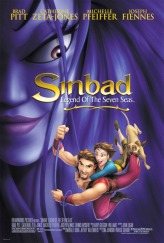|
Sinbad: Legend of the Seven Seas
|
| |
 |
USA, 2003. Rated PG. 86 minutes.
Cast:
Brad Pitt, Catherine Zeta-Jones, Michelle Pfeiffer, Joseph Fiennes, Dennis
Haysbert, Adriano Giannini
Writer: John Logan
Music: Harry Gregson-Williams
Producers: Jeffrey Katzenberg, Mireille Soria
Director: Patrick Gilmore, Tim Johnson
LINKS
|
 f
you visit Dreamworks' official site for Sinbad: Legend of the Seven Seas,
you can watch media clips of interviews wherein Brad Pitt and Michelle Pfieffer,
two of the voice stars of the film, admit that they weren't really familiar
with the legend of Sinbad before they worked on the movie.
f
you visit Dreamworks' official site for Sinbad: Legend of the Seven Seas,
you can watch media clips of interviews wherein Brad Pitt and Michelle Pfieffer,
two of the voice stars of the film, admit that they weren't really familiar
with the legend of Sinbad before they worked on the movie.
They still aren't.
When you think of Sinbad, you think of middle-eastern adventures and The
Arabian Nights, which also gave us Ali Baba and Aladdin. When you think
of Sinbad, you don't think of capricious goddesses, the deadly song of the Sirens,
or journeys to Tartarus. That's what comes to mind when you think of Greek epics.
Yet that's what Sinbad: Legend of the Seven Seas gives us.
Color me cranky, but I'm sick of Hollywood "improving" classic stories, or
in this case, inventing an entirely new one and slapping the name of a legendary
hero from another time and place on it. There are only two scenes in the entire
film, incidents involving a giant fish and a giant bird, that have anything
to do with the original Arabian Nights. Instead, writer John Logan (Gladiator)
drew more from The Odyssey and from Damon and Pythius, a tale of friendship
in which one man was willing to sacrifice his life for the other.
Oh sure, Dreamworks has given Sinbad and his crew a vaguely ethnic look and
some earrings, but this movie is definitely set in the Greek mythos. Sinbad
has become a pirate on the Mediterranean Sea instead of a merchant on the Indian
Ocean, and his home is Syracuse instead of Baghdad. Ah…Baghdad. Perhaps political
concerns explain the shift in setting? Too bad. Hollywood missed an opportunity
to teach kids that not all Arabs are maniacs who blow up buildings or chase
Arnold Schwarzenegger around with automatic weapons.
Of course, none of these concerns necessarily has anything to do with whether
Sinbad: Legend of the Seven Seas is any good. The answer to that question
is, yeah, sort of. Sinbad is run-of-the-mill animated fare with a few
extra fart jokes—Dreamworks is the studio that gave us Shrek,
remember. (Parents: Note that this film is rated PG, not G.)
The biggest shortcoming is the sketchy story. We have a villain, Eris (Pfeiffer),
who in the opening scene just decides she's going to make mischief for the heck
of making mischief. "Let the games begin," she says, as if any more exposition
than that in her brief speech would be intolerable. She has no personal grudge
against the heroes of the film. She's just the goddess of chaos, and mischief
is what the goddess of chaos makes, I suppose. The effect is facile and unsatisfying.
Then we have a battle with a sea monster and the reunion of two long-lost friends,
Sinbad the pirate (Pitt) and Prince Proteus (Joseph Fiennes), whose paths have,
shall we say, diverged. Eris frames Sinbad for the theft of the Book of Peace,
a Raiders of the Lost Ark-like artifact that in the right hands bestows
international harmony and tranquility, and in the wrong hands guarantees the
equivalent of the Israeli-Palestinian conflict. However, it is Proteus who will
die if Sinbad fails to find and return the book. He and first mate Kale (Dennis
Haysbert) sail off with a determined Marina (Catherine Zeta-Jones), Proteus's
fiancée, aboard as a stowaway.
The characters are even thinner than the premise. Too much of the backstory
is taken for granted or described secondhand. In particular, the friendship
between Sinbad and Proteus is not believable—especially Proteus's fervent
belief that Sinbad will do the right thing—but it's not a bad thing for
kids to see. More difficult to accept is Marina. How did the Ambassador from
Thrace learn to sail so well, anyway? In the effort to demolish the stereotypes
of the past, it seems all heroines now are spunky and capable, and that's the
sum total of their character traits.
Okay, now I'm definitely being cranky. The worthy animation, a seamless blend
of computer animation and traditional drawings that gives us the best of both,
deserves praise. The expressively drawn characters inhabit a rich and colorful
world that could only have been created with computer technology, but there
are no creepy digital human faces or bodies. The skilled animators deliver much
the film's excitement and humor, compensating for the sometimes flat and tasteless
verbal jokes, which alternately target children or adults. There will be some
potty humor, and then, after nearly bumping into Kale in freezing weather, Sinbad
will order him to put on a shirt on before he puts somebody's eye out. Kale
has been drawn with nipples, it seems, for that one joke.
The disappointment of Sinbad is less that it butchers the actual story
of Sinbad, but that, with a little more foundation and characterization, it
could have been very good indeed. Sinbad isn't that bad; it's just that
it could have been so much more, a grand epic to rival the best films ever put
out by Disney. As it is, it's a decent way to spend a summer afternoon with
your kids—much better than, say, with the violence and brutality of a film
like The Hulk—but it's not a movie you'll be rushing to add to your
children's collection when it comes out on video.
Review
© July 2003 by AboutFilm.Com and the author.
Images © 2003 Dreamworks LLC. All Rights Reserved.


